
Exercise with Hearing Aids – Everything You Need to Know
If you’re a new hearing aid wearer, you might be concerned that having a hearing aid comes at the expense of a healthy and active lifestyle. However with today’s advances in hearing technology, it’s not just acceptable to wear hearing aids while exercising – it’s actually recommended. Here’s what you need to know.
Why exercise with hearing aids?
While some wearers might be tempted to take their hearing aids out during exercise for protection, there are three good reasons why you should leave them in.
It makes for a safer workout
Improved hearing makes for safer physical activity. This is particularly true for those of us who enjoy exercising outdoors where it’s important to remain aware of potential hazards. If you’re jogging down the street, for example, you’ll want to ensure you can hear approaching cars or other pedestrians. It also means other people can alert you to risks you might not be aware of.
You can listen to music
If your hearing aid connects to a wireless device, you can get motivated with a playlist that keeps you moving. Just ensure that it’s turned down enough to hear what’s going on around you, so you’re aware of any risks (see above).
You can communicate with others
Communication is vital if you’re playing a team sport, but it’s just as important when you’re going for a walk with a friend. Leaving your hearing aids in means that you can stay connected with those around you while you exercise.


Are there any forms of exercise I can’t do?
You’ll have to take your hearing aids out before swimming, or any other activity that causes them to be fully submerged in water. While most modern hearing aids are resistant to light moisture, they aren’t designed for underwater use.
If you wear a behind-the-ear hearing aid, it’s also a good idea to discuss your choice of exercise with a Bay Audio clinician first. Because they sit on the outside of your head, they’re more exposed to sweat and potential damage.
4 tips for exercising with hearing aids
- Get your hearing aids insured if you lead a particularly active lifestyle. Knowing accidental damages are covered will give you peace of mind while working out.
- Wear earplugs if you go swimming so water doesn’t get trapped in your ear. Not only can this damage your hearing aid, but it can also lead to ear infections.
- Consider using a clip to prevent hearing aids from falling out during contact sports (see our list of hearing aid accessories below).
- Wear clothes that don’t interfere with your hearing aids. Caps, hooded sweatshirts, and sunglasses can sometimes displace them during physical activity.


Post-workout care for hearing aids
Give your hearing aids a routine clean after each workout to remove any sweat or dirt. This should include:
- Using a clean cloth to dry off any moisture.
- Sanitizing with an antimicrobial spray to prevent bacterial growth (give them another wipe down after this).
- Remove any excess dirt or wax with a pick.
- Shower to ensure your ears are clean before reinserting your hearing aids.
Hearing aid accessories for exercise
If you’re constantly at the gym or staying active, there are some hearing aid accessories that can make exercise a little easier. For example:
Drying equipment
Purpose-made dehumidifiers and dehydrating boxes will completely dry out your hearing aids after a workout, in anywhere from 45 minutes to overnight. They’re a worthwhile investment for anyone who enjoys an intense workout or swims often.
Hearing aid clips
Clips attach to your clothing or extend behind the back of your head to prevent hearing aids from falling out, making them particularly useful for contact sports.
Sweat-resistant pouches
If you wear a behind-the-ear hearing aid, it’s worth housing it in a sweat-resistant pouch during your workout. These washable protectors will ensure no sweat or moisture enters the circuitry.

Discuss your exercise plans with a hearing professional
Your local Bay Audio clinicians can answer any questions you have about exercising with hearing aids and provide the accessories you need.
